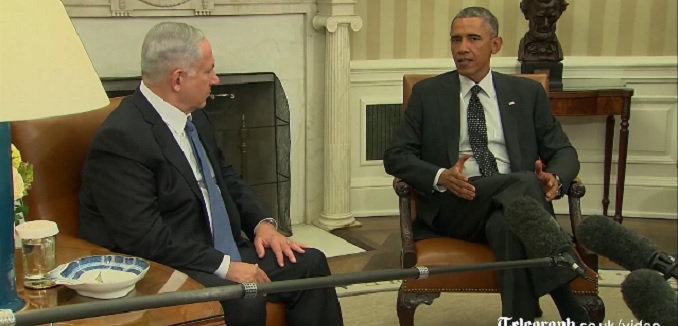A White House meeting on Wednesday between President Barack Obama and Israeli Prime Minister Benjamin Netanyahu saw the two leaders emphasizing mutual cooperation across a range of issues, with Netanyahu also outlining how new regional realities have aligned Jerusalem with traditional U.S. allies long considered hostile to the Jewish state. The two leaders spoke to reporters for several minutes, before adjourning for a meeting that lasted almost a full hour past the pre-allotted one hour time.
Referring to the Prime Minister by his nickname, the President told journalists that “I think I’ve met with Bibi more than any world leader during my tenure as president,” before partially cataloging extensive U.S.-Israeli security and diplomatic cooperation:
“We meet at a challenging time,” Obama said before the meeting. “This gives us an opportunity, once again, to reaffirm the unbreakable bond between the United States and Israel.”
Netanyahu for his part thanked the President for the latter’s “efforts to prevent Iran from acquiring nuclear weapon” and highlighted Jerusalem’s shared commitment with Washington to securing a diplomatic solution that would see a viable Palestinian state created alongside a secure Jewish one.
Behind the mutual plauditory gestures were substantive shifts in how the Middle East is geopolitically configured. Washington’s Israeli and Arab allies – Saudi Arabia, Egypt, Jordan, and most of the Gulf states – have in recent years found themselves aligned opposite blocs of Iran-led Shiite extremists and Sunni jihadists underwritten in part by Turkey and Qatar. Netanyahu pressed that specific point, telling Obama that he seeks to more openly consolidate ties between Jerusalem and various Arab states:
Netanyahu told Obama at the outset of the meeting that along with these threats there are also opportunities due to the fact that Israel and a number of leading Arab countries have common interests they didn’t have before.
“I think we need to seize upon those common interests to advance security and peace in the Middle East,” he said.
The Israeli leader has been heavily emphasizing such scenarios, telling audiences in mid-September and during his Monday afternoon UNGA speech that issues ranging from Iranian expansionism to the spread of ISIS were driving Israeli-Arab cooperation in domains far removed from the Palestinian theater.
There are reasons to believe that the White House shares Netanyahu’s assessment at least in part. Obama had just a few days before told the United Nations General Assembly (UNGA) that Arab nations had to stop using Israeli-Palestinian tensions “as an excuse to distract people from problems at home.”
[Photo: The Telegraph / YouTube]




